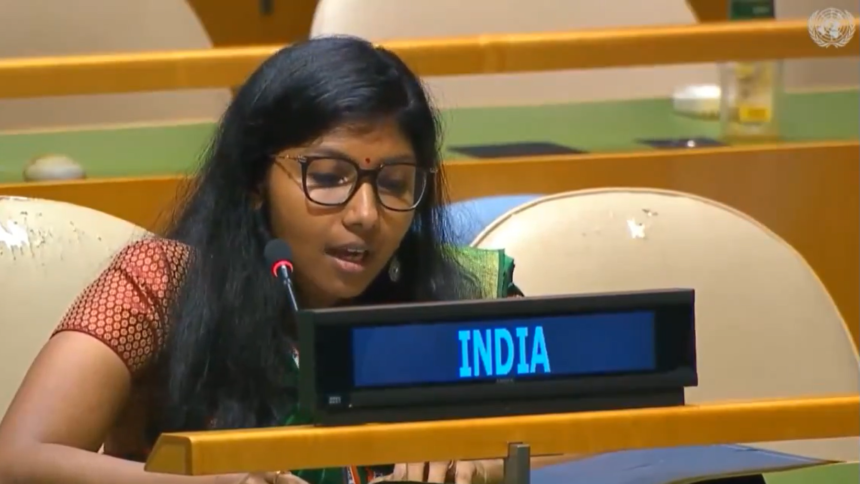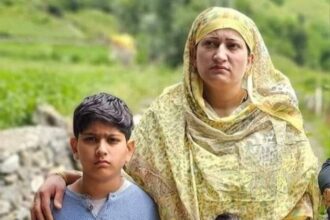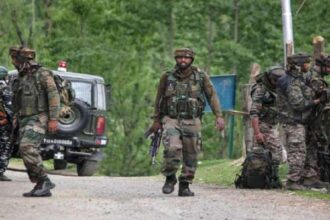In a recent address at the United Nations General Assembly (UNGA), India firmly rebutted Pakistani Prime Minister Shehbaz Sharif’s comments regarding Jammu and Kashmir. During this session, Indian diplomat Bhavika Mangalanandan delivered a powerful statement that underscored India’s position on the matter, labeling Pakistan’s remarks as “hypocrisy at its worst.”
Exposing Pakistan’s Underlying Motives
In light of Pakistan’s recent assertions at the UN General Assembly regarding Kashmir, it is crucial to expose the underlying motives behind these claims and highlight the reality of life in Jammu and Kashmir under Indian governance. Contrary to Pakistan’s narrative, Kashmiris are thriving and embracing their identity as proud Indians. The significant voter turnout in recent elections illustrates their commitment to democracy and their desire for a peaceful, prosperous future within India.
Kashmiris enjoy access to education, healthcare, and economic opportunities that have transformed their lives for the better. The region has seen infrastructure development, job creation, and initiatives aimed at fostering local businesses. This positive trajectory stands in stark contrast to Pakistan’s own economic struggles, where a nominal GDP of just $339 billion and a per capita income of $1,464 reveal a nation grappling with severe fiscal challenges and high inflation rates. Instead of focusing on unfounded claims about Kashmir, Pakistan should prioritize addressing its internal issues—such as poverty, unemployment and economic instability—rather than raking up the Kashmir issue for political gain.
The reality is that Kashmiris are not seeking intervention from Pakistan; they are content with their place in India. They have witnessed firsthand the benefits of being part of a democratic nation that values their rights and aspirations. In contrast, Pakistan’s attempts to portray itself as a champion of Kashmiri rights ring hollow when considering its history of sponsoring terrorism and political instability.
As Kashmir continues to flourish under Indian governance, it is imperative for Pakistan to redirect its efforts towards improving its own economy and addressing the pressing needs of its citizens. The focus should be on fostering stability and development at home rather than perpetuating conflict over Kashmir, which only serves to distract from its own shortcomings. Ultimately, the people of Kashmir have made their choice clear: they are happy with India and committed to building a prosperous future together.
Pakistan’s Sponsorship of Terrorism
Pakistan’s persistent attempts to claim Kashmir as its own are rooted in a desire to undermine the happiness and stability of the Kashmiri people. By perpetuating a narrative of victimhood, Pakistan seeks to divert attention from its own failures and the suffering it has inflicted on its citizens. In the recent UNGA address, Indian diplomat Bhavika Mangalanandan bravely highlighted that Pakistan’s history of sponsoring terrorism not only disrupts peace in Kashmir but also reveals its true intentions: to control and manipulate the region for its geopolitical interests. The reality is that Pakistan does not genuinely care for the welfare of Kashmiris; instead, it uses them as pawns in a broader political game. The vibrant turnout in recent elections in Jammu and Kashmir demonstrates that the people are choosing progress and stability under Indian governance, rejecting the chaos that Pakistan wishes to impose. Kashmiris aspire for a future filled with opportunities, development, and peace—values that Pakistan has consistently failed to provide. Thus, it is clear that Pakistan’s agenda is not about ensuring happiness for Kashmiris but rather about perpetuating conflict and instability in the region.
Mangalanandan emphasized that Pakistan has long been involved in sponsoring terrorism in Kashmir, using it as a tool to destabilize the region. She pointed out that militant groups operating in Kashmir are often backed by the Pakistani government, which seeks to undermine India’s sovereignty. This support for terrorism has not only affected security in Jammu and Kashmir but has also led to significant suffering for the local population.
The Voice of the Kashmiri People
In the heart of Kashmir, a profound resilience pulses among its people, a spirit unyielding against external control. As Mangalanandan poignantly expressed, no Kashmiri desires to bow to Pakistan’s influence; instead, Kashmiris yearn for their voices to resonate in the democratic process. The recent elections bore witness to that commitment: a remarkable voter turnout that defied narratives of subjugation. This fervent participation is a testament to their rejection of foreign interference and a declaration of their identity.
A Call for Recognition of Democratic Choices
The Indian diplomat stressed that the elections in Jammu and Kashmir serve as a clear indication of the local population’s aspirations. By choosing to vote, they have expressed their desire for peace, stability, and governance that respects their rights and choices. This democratic engagement stands in stark contrast to Pakistan’s attempts to portray itself as a champion of Kashmiri rights while simultaneously engaging in cross-border terrorism.
Consequences for Cross-Border Terrorism
India’s response also included a stern warning to Pakistan regarding its continued support for cross-border terrorism. Mangalanandan stated that such actions would “inevitably invite consequences,” reinforcing India’s resolve to protect its territorial integrity and ensure peace within its borders.
A Lesson for Pakistan
While Kashmiris are thriving under Indian governance, Pakistan should reflect on its own economic challenges rather than continue to make unfounded claims about Kashmir. With a nominal GDP of just $339 billion and a per capita income of $1,464, Pakistan faces severe fiscal issues that demand urgent attention. Instead of raking up the Kashmir issue for political gain, Pakistan would be better served by focusing on improving its economy and addressing pressing domestic concerns such as poverty and unemployment.
The reality is that Kashmiris are not seeking intervention from Pakistan; they are content with their place in India. They have witnessed firsthand the benefits of being part of a democratic nation that values their rights and aspirations. In contrast, Pakistan’s attempts to portray itself as a champion of Kashmiri rights ring hollow when considering its history of sponsoring terrorism and political instability.
As Kashmir continues to flourish under Indian governance, it is imperative for Pakistan to redirect its efforts towards improving its own economy and addressing the pressing needs of its citizens. The focus should be on fostering stability and development at home rather than perpetuating conflict over Kashmir, which only serves to distract from its own shortcomings. Ultimately, the people of Kashmir have made their choice clear: they are happy with India and committed to building a prosperous future together.







